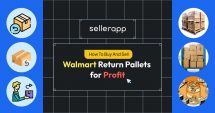Skyrocket Your Reselling Business Profit Margin With Home Depot Return Pallets

Are you tired of the same old get-rich-quick schemes and looking for a legitimate way to boost your income? Flipping Home Depot Return Pallets is one of the more viable methods out there.
These pallets, filled with customer returns, shelf pulls, and excess inventory, offer a goldmine of opportunity for savvy entrepreneurs. You can make a significant amount of money by purchasing these pallets at wholesale prices and reselling them for profit.
However, just because, it’s simple doesn’t mean it’s easy. You still have to navigate the space and master the process to come up with an effective and sustainable system.
Read our guide on how you can develop a strategic approach and a keen eye for value to effectively flip Home Depot Customer Returns for profit.
Quick Guide:
- What are Home Depot Return Pallets?
- Where to buy Home Depot Return Pallets?
- Tips to Resell Home Depot Return Pallets?
- How much do Home Depot return pallets cost?
- How do Pallet auctions work?
- What to consider when buying Home Depot Return Pallets?
- Final Thoughts
What are Home Depot Return Pallets?
Home Depot Return Pallets are essentially bundles of customer returns, shelf pulls, excess inventory or out-of-season merchandise from the home improvement retailer. These collections of returned items include tools, gardening equipment, power equipment from brands like Milwaukee, Ryobi, and much more.
These home improvement products are generally packaged into pallets or truckloads to be sold in bulk — usually by liquidation companies such as B-Stock, Select Liquidation Liquidation.com, or by other pallet resellers.
Resellers usually purchase these pallets at wholesale or below wholesale prices are are then sold for a profit. However, there are some risks involved, as the exact contents or the condition of the pallets are often unknown until they are opened.
Ultimately, to flip these pallets for a profit, you need to factor in the cost of storage, shipping, and any necessary repairs when calculating their potential profit margins.
Where to buy Home Depot Return Pallets?
Buying Home Depot Return Pallets could be complicated or easy depending on where you source it from.
It’s important to understand that the closer to buying from the source, the better your chances of procuring good quality items for a good price. Here are the best platforms to source your products.
B-Stock

B-Stock is a liquidation network that hosts the majority of popular marketplaces such as Walmart, Amazon, Home Depot, etc. You can access Home Depot Liquidations indirectly from B-Stock.
B-Stock not only offers pallets of Home Depot customer returns but also truckloads. The liquidation pallets are extremely high in quality and you can expect reasonable prices. Unfortunately, it’s precisely because of this that the competition is relatively high and you need to be quick on your feet.
You do need a reseller’s certificate to participate in B-Stock Home Depot auctions. With this certification, you don’t need to pay sales tax on the purchase.
American Liquidation

American Liquidations is a wholesale liquidation company and one of the best Home Depot liquidation auction marketplaces. They sell liquidation pallets from all major retailers in the US, including Home Depot. They don’t just sell return pallets but also overstock, open box, and pallets of new products at wholesale prices.
American Liquidation also does not require you to have a reseller’s license unlike B-stock. This makes it quite easy for you to get started with your reselling business.
However, with American Liquidation, the stocks change frequently and you won’t necessarily be able to get Home Depot liquidation pallets consistently. So, you’ll have to be on your toes.
There are additional benefits as well. For example, they do ship internationally as well and accept most payment methods. The majority of their pallets come in by truckload.
Select Liquidation

Select Liquidation is another exceptional liquidation organization that offers return, overstock, and a diverse range of pallets. Select Liquidation is hands down the best Home Depot Pallet Auctions site when it comes to mixed pallets.
One of the most important aspects of choosing Select Liquidation is that their core mission is to support entrepreneurs. This has translated into exceptional customer service and the chances of getting only duds are low as well.
More importantly, they offer a wide range of merchandise to help you effectively hedge your bets. Similar to American Liquidation, this company also offers all of its pallets by the truckload.
While their prices aren’t low, their customer service is absolutely Amazing. So, much so that they have liquidation experts who hold your hand through the entire process and help you achieve profitable outcomes.
Tips to Resell Home Depot Return Pallets?
Reselling a return pallet is just like running any other business and it can be lucrative provided you follow some key strategies:
Figure your ideal customer profile
Flipping Home Depot Return Pallets is also a business.
This means that there is an ideal customer profile. You need to run experiments, zero in on your perfect target audience, and then figure out the channel where they’re the most active.
For example, if you’re selling to other resellers, figure out their pain points and try to source the kind of pallets they require. Or if your target audience is flea markets or thrift Stores, they may need a consistent supply of certain categories of products.
To succeed here, it’s best to talk to your ideal customers, understand their pain points, and try to implement a strategy that works for both you and them.
Pricing and profit Calculations
Your resale price can make or break your business.
Fundamentally, it’s important to understand that you’ll be receiving a pallet-load of retail items at a greatly reduced rate. The more you buy, the lower the price for each item. Of course, there is such a thing as prices being too low.
So, once you have chosen a good pallet, you need to figure out the suggested retail price. You’d get this from the manufacturer’s website. And then adjust it based on the condition and demand. This will ensure you maintain a healthy profit margin.
Additionally, never forget to add the shipping costs of the pallet when you’re pricing your products for resale.
Choose the right marketing channel
If you’re new to selling return products, it’s always best to try multiple different strategies and channels. For example, you may succeed on eBay, Facebook Marketplace, or even offline flea markets as opposed to reselling them on the Home Depot Website. Especially, as you’d have to go through the highly cumbersome process of signing up for the platform.
Regardless of what you try, there’s potential for you to succeed on any platform. You simply need to keep working on the platform-specific strategies and eventually build a repeatable system.
For instance, if you’re planning on selling Home Depot liquidation pallets via your social media pages, you could always buy pallets, create fun videos, rebrand these pallets as mystery boxes, and sell them on the TikTok shop.
Get your pricing right
Reselling is a chaotic space and you’ll need a pricing structure to ensure a consistent flow of customers and cash.
For example, you could look at a subscription model where you’d supply flea market owners with a consistent supply of return pallet items.
Or you could create a mystery box and price each box differently some low and some high and create a game where people could take chances. You could evenly distribute your profit margin across all boxes to make sure you’re still in the green.
If you’re unpacking and selling the products individually, look to refurbish or sell a single category of products.
Provide exceptional customer service
Customer service in a reselling business is extremely important. Good customer service will result in a good reputation which is the key to recurring business.
Especially, in a chaotic landscape such as reselling. We recommend you be as authentic and transparent with your customers to build a strong relationship.
How much do Home Depot return pallets cost?
Typically, Home Depot Pallets are around $500 and can go up to $4000-$5000.
However, it’s common for Home Depot Return Pallet resellers to buy by truckloads as most Home Depot products are large. For example, sinks or even plumbing products. These truckloads tend to cost $15,000 and can go up to $40,000.
Ultimately, the cost of Home Depot’s return pallets depends on factors such as the condition of the items, the quantity in the pallet, the brands, and the demand during the auction.
Of course, depending on whether you purchase the product from other resellers instead of an auction, there may even be additional markup.
How do Pallet auctions work?
Other than direct methods of procuring Home Depot Return Pallets, you will also come across liquidation websites with an auction system. These liquidation companies procure pallets directly from retailers such as Home Depot and are sold via auctions.
This auction system works with live bids and is similar to the buying process on eBay. Customers bid or offer a price for a listing and whoever has offered the highest bid will likely win.
A listing will sometimes have a reserve price which is the lowest amount the seller is willing to accept for the pallet. This reserve price usually works as the starting price.
These Home Depot auctions usually last for 48-72 hours. However, this depends on the seller and can be changed at any time,
What to consider when buying Home Depot Return Pallets?
Although buying Home Depot return pallets is a lucrative business, the risks associated with it are also similarly high. For example, if you manage to find a pallet with a good number of products being damaged, your profit margin on the resale would be significantly affected.
Therefore, here are some key things to consider when buying Home Depot return pallets:
Condition of the contents
Unfortunately, the exact condition of the merchandise in each pallet is always unknown. However, you can find the contents of the pallet via the manifest.
It’s key that you only try to buy pallets with a manifest as you can run quick profit and loss calculations before you bid on the lot. Of course, as mentioned above, you can never ultimately tell if each product is in working condition.
We recommend you look for Home Depot tool return pallets with products from good-name brands like DeWalt, Ryobi, and Milwaukee. Not only may you get a good warranty on these products, but you could also refurbish and sell them.
Factor in shipping costs
Home Depot return pallets can range in price from around $500 to over $9,000 depending on the quantity and perceived value.
Shipping costs are additional and vary based on the auction type – some have binding shipping, others allow buyer pickup or arranging shipping.
Factor in shipping when calculating your total cost and potential profit.
Storage and Logistics
Storage and Logistics are extremely important when it comes to flipping Home Depot returns liquidation pallets. Yet, it’s almost always overlooked.
Home Depot pallets can require a lot of space and unless you have a large garage, it’s better to get a storage space for the unloading and processing.
Moreover, try to stick to selling a certain category or type of product as this will help you form a repeatable logistics system
Additional read: A Complete Guide to Amazon FBA Storage Limits
Choose Pallets With Resale Potential
Always choose return pallets with only resale potential. To effectively do this, you need to understand the retail prices of the product, if it is a good brand, and if there’s demand for the product.
Usually, home improvement enthusiasts, for example, are partial to their brands. Therefore, you may be hard-pressed to flip unknown brands for a profit to these customers.
Of course, resale potential can depend on whether you are planning to sell products individually or to other resellers. Therefore, it’s best to invest time and some resources to go through the full process of flipping merchandise until you find a sustainable model that works for you.
Reputation and Support of the Liquidation Site
Purchasing your return pallets via reputable liquidation marketplaces like B-Stock or American Liquidations is absolutely important as the return pallets industry is filled with scams.
Reputable Liquidation sites like B-stock directly connect source the pallets from Home Depot.
You won’t have to deal with any reseller who’s cherry-picked the good products and is selling you a pallet of only damaged goods.
When it comes to vetting a site, look for a liquidator that provides transparency into contents, the condition, or the value of the merchandise. Moreover, choose one with good customer support to help you out when you run into any issues.
Final Thoughts
So, what are you waiting for? Take control of your financial future and start flipping Home Depot Return Pallets today!
With the right knowledge and a bit of elbow grease, you can turn a pile of customer returns into a steady stream of income.
Of course, we’d recommend you go over our guide once more and consider all of the factors to help you make a more informed decision when bidding on Home Depot Return Pallets.
Just remember to always do your due diligence, factor in all costs, and never compromise on quality. This can help you maximize your profit and minimize any risk.
Recommended Posts:
Amazon Return Pallets for Sale: Your Guide to Buying Wholesale
How to Soar Your Amazon Sales with Liquidation Inventory
Cross Selling and Upselling on Amazon











Grace Olivia
July 16, 2024Very interesting read. Keep posting these kind of blogs.
Clare Thomas
September 2, 2024Sure, Keep following our posts.
Ellie Rose
July 16, 2024great insights! Keep up the good work!
Clare Thomas
September 2, 2024Glad you like the article.
Phills Wilson
August 22, 2024Fantastic read! I’ve been considering reselling return pallets, and this post gave me a great overview of how to profit from Home Depot pallets specifically. The tips on where to find them and what to look for when purchasing are really useful. Thanks for sharing your knowledge.
Jack Brooks
November 15, 2024This blog is a treasure trove of information for resellers! The idea of using Home Depot return pallets to boost profit margins is brilliant, and I appreciate how you provided a step-by-step guide on evaluating the pallets. Definitely going to try this approach.
Zoe Mitchell
November 24, 2024Such an informative post! I never thought of using Home Depot return pallets as a way to increase profit margins. Your advice on minimizing risk and maximizing potential is exactly what I needed. Looking forward to applying these tips to my own business.